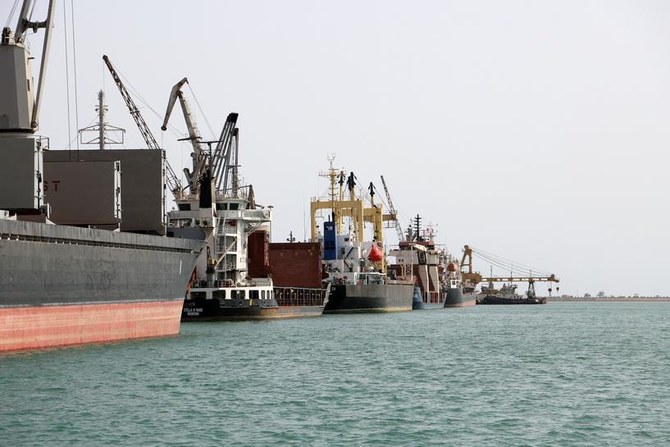AL-MUKALLA: The Coalition has threatened to use force if the Houthis do not immediately release the UAE-flagged cargo ship they hijacked off the Yemeni western port city of Hodeidah on Sunday.
The Coalition said the ship had been transporting medical equipment from the remote Yemeni island of Socotra in the Arabian Sea to the Saudi port of Jazan when armed Houthis attacked it.
“The terrorist Houthi militia will bear full responsibility as a result of its criminal act of piracy against the ship, which violates the customary International Humanitarian Law, the San Remo Manual on Armed Conflicts at Sea, and the UN Convention on the Law of the Sea,” coalition spokesperson Brig. Gen. Turki Al-Maliki said in a statement carried by the Saudi Press Agency. “The militia must promptly release the ship, or the coalition forces will undertake all necessary measures and procedures to handle this violation, including the use of force if necessary.”
Houthi military spokesperson Yahiya Sarae on Monday admitted seizing the ship, claiming it was carrying weapons and military supplies for the Saudi-led coalition.
The hijacking has sparked condemnation in Yemen and revived demands for purging the militia from western coastal areas under its control.
Yemeni experts and officials said the latest incident confirmed their concerns about Houthi threats to international maritime routes through the Red Sea, renewing their demands that the Houthis be designated a terrorist organization.
Warning 001/JAN/2022
Category: Attack
Time: 02 January 2022 2150UTC
Description: UKMTO has received reports of an attack on an MV in position 1513.0N 04212.0E (Approx. 23 NM West of Ras Isa Marine Terminal). Investigations
ongoing.#MaritimeSecurity #MarSec pic.twitter.com/ONe36YiHEH— United Kingdom Maritime Trade Operations (UKMTO) (@UK_MTO) January 3, 2022
Sadek Dawed, a spokesman for the National Resistance Forces, a military unit battling the Houthis on the country’s west coast, accused Iran of pushing the militia into attacking ships to undermine security in the Red Sea, saying that the country’s reputation had been greatly damaged by attacks from Somali pirates, Al-Qaeda, and the Houthis.
“We condemn Iran's attempts to sabotage Yemen’s land, people, reputation and its capabilities,” he tweeted. “We reiterate the duty to support our national efforts to restore Yemen, which has been kidnapped by Iran's wars and its tools in the region.”
Yemeni journalist Samer Rashad Al-Yosofi attributed the hijacking to the international community’s lenient reactions to the militia’s crimes and its insistence on convincing the Houthis to accept peace efforts through peaceful means.
“Iran’s agents are talking about seizing a military cargo ship belonging to the coalition in the Red Sea, even though it is a commercial ship operating in Jazan. This is due to relying on mediations and peace initiatives presented to them (Houthis),” he said.
Journalist and activist Kamel Al-Khodani said the Houthi attack on the ship showed that the militia did not just pose a threat to Yemen.
“This hypocritical world must understand that we are fighting gangs and bandits that not only threaten Yemen but the world. There is no safety and no peace for the international sea lanes and the region before eliminating them.”
The coalition has intensified air raids against Houthi targets across Yemen, killing dozens and destroying vehicles.
It said on Sunday night that it had killed more than 200 Houthis and destroyed 22 military vehicles in the province of Shabwa during the past 24 hours.
The airstrikes have helped Yemeni government troops to make military gains and seize control of the district of Ouselan.
























